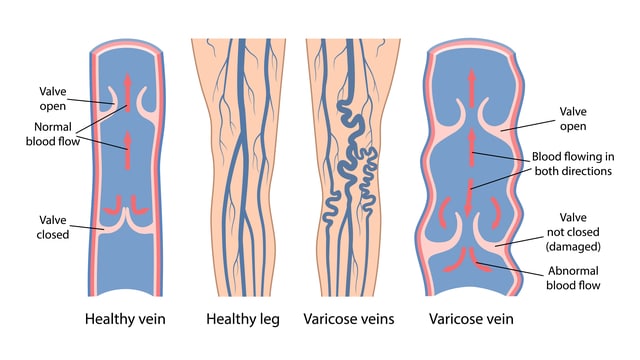Whether it’s piercing blue eyes and a great metabolism, or thinning hair and poor eyesight; what we inherit from our parents can leave us feeling equally grateful or frustrated. While something like the colour of our eyes tends to be relatively unimportant, other health factors which are passed on through genes can be a lot more significant.
Varicose veins are quite common, affecting up to a third of the adult population. The condition is well known for its twisted and bulging appearance. While there is a range of factors that lead to varicose veins developing, the most common one is the hardest to control – genetics. So, are varicose veins hereditary? They sure are.
How do varicose veins form?
Your veins are lined with tiny one-way valves which act like pumps that push the blood in one direction. When too much pressure is put on the valves, the vein walls are weakened or the blood isn’t moving properly, these valves start to fail, causing the blood to pool and varicose veins to develop.
Unlike many other parts of your body, these valves don’t heal over time, so if they’re damaged or weakened, the vein can become compromised.
Are varicose veins hereditary?
Extensive studies which have been conducted on large groups of people have shown that there is a range of genes that leave us predisposed to varicose veins. For some people, it’s a gene that means the valves themselves are inherently weakened, for others it may be a family history of low blood pressure or bad circulation.
While some traits from your parents may not be strong, their veins certainly are. In fact, if there are varicose veins on your father’s side, you’re 30 per cent more likely to develop them. If they’re on you’re mother’s side, it’s even more likely at 40 per cent.
If both your parents have varicose veins, then there’s a 70 per cent chance you will develop them too!
While this might seem bleak, there are things you can do to reduce the symptoms.
How to manage varicose veins
Although varicose veins are hereditary, improvements to general vein health will reduce the severity of symptoms.
Here are some tips:
- Exercise regularly, walking at least 20 minutes a day.
- Eat additional plant-based foods like fruit and veggies.
- Reduce fatty and sugary foods.
- If you drink a lot of alcohol or smoke, cut back as much as you can.
While diet and lifestyle changes can improve your comfort and the symptoms, having your veins treated by a specialist is the only way to properly treat and remove the varicose veins to provide lasting relief and improved vein health. Speak to a vein specialist today to see what can be done about your veins.
Learn more: Home remedies for varicose vein symptoms
Seek expert advice
The doctors at The Vein Institute specialise in varicose vein treatment. We offer patients a comprehensive program using non-surgical laser treatment techniques. You can learn more in our Definitive Guide to Varicose Vein Treatment.
The benefits of non-surgical treatment are:
- Walk-in walk-out treatment
- 98% success rate
- Extremely effective
- Can be performed at a clinic (no hospitalisation)
- No general anaesthetic
- Medicare rebates apply
- No downtime or time away from work
Call us on 0420 102 637, or fill out our booking request form.

